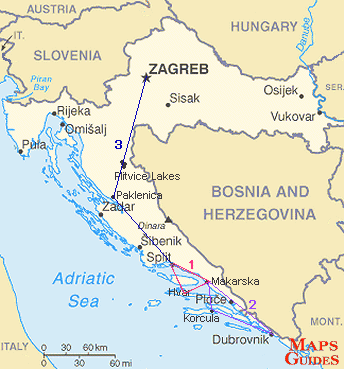Croatia (Croatian: Hrvatska /xrvatska/), officially the Republic of Croatia (Republika Hrvatska), is a southern Central European and a western Balkanic country at the crossroads between the Pannonian Plain and the Mediterranean Sea. Its capital is Zagreb. Croatia borders with Slovenia and Hungary to the north, Serbia to the northeast, Bosnia and Herzegovina to the east, and Montenegro to the far southeast. Its southern and western flanks border the Adriatic Sea, and it also shares a sea border with Italy in the Gulf of Trieste. Croatia is a member of United Nations, the Organization for Security and Co-operation in Europe and the Council of Europe. The country is also a candidate for membership of the European Union and has received a NATO membership invitation on 3 April 2008. On October 17, 2007 Croatia became a non-permanent member of the United Nations Security Council for the 2008-2009 term. Croatia is located between South-Central Europe and Middle Europe. Its shape resembles that of a crescent or a horseshoe, which flanks its neighbours Serbia, Bosnia and Herzegovina and Montenegro. To the north lie Slovenia and Hungary; Italy lies across the Adriatic Sea. Its mainland territory is split in two non-contiguous parts by the short coastline of Bosnia and Herzegovina around Neum.
WikipediaThe lands that today comprise Croatia were part of the Austro-Hungarian Empire until the close of World War I. In 1918, the Croats, Serbs, and Slovenes formed a kingdom known after 1929 as Yugoslavia. Following World War II, Yugoslavia became a federal independent Communist state under the strong hand of Marshal TITO. Although Croatia declared its independence from Yugoslavia in 1991, it took four years of sporadic, but often bitter, fighting before occupying Serb armies were mostly cleared from Croatian lands. Under UN supervision, the last Serb-held enclave in eastern Slavonia was returned to Croatia in 1998.
CIA The World Factbook 




